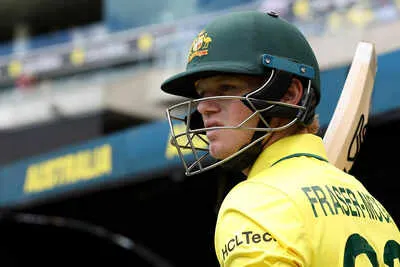
Once touted as Australia’s next limited-overs batting sensation, Jake Fraser‑McGurk now finds himself in uncertain territory. After a string of underwhelming ODI performances, legendary cricketer Ricky Ponting, who was once one of his loudest supporters, has publicly voiced concerns over the young batter’s consistency and place in the national side.
Fraser‑McGurk’s natural talent and explosive strokeplay earned him early comparisons to David Warner and a fast-track into Australia’s white-ball setup. However, his ODI returns have been disappointing. In seven matches, he has scored just 98 runs, averaging below 15, and has often failed to survive beyond the opening overs. What was once seen as fearless aggression is now being criticized as reckless batting without a plan.
Ponting, who had previously praised Fraser‑McGurk’s potential to be a “three-format player,” has since cooled on the hype. Speaking on his recent form, Ponting admitted that “the selection panel is going to find it harder and harder to keep justifying his place.” The tone of backing has shifted to a call for improvement. The message is clear: raw ability will no longer be enough at the international level.
The timing of this slump is particularly unfortunate, as Australia approaches the Champions Trophy and begins preparations for future white-ball tournaments. While players like Travis Head and Steve Smith have provided stability, Fraser‑McGurk’s inconsistency is now seen as a liability, especially with several young talents pushing for selection.
In his recent outings, Fraser‑McGurk’s shot selection has been heavily scrutinized. He has often tried to dominate from the first ball, showing little inclination to build an innings. Despite having the power game to clear boundaries with ease, the lack of adaptability and game awareness has cost him repeatedly, especially on challenging surfaces.
Australia’s captain Steve Smith has continued to show patience, calling Fraser‑McGurk a “dangerous player” capable of winning matches single-handedly. But even Smith has acknowledged that “better decisions under pressure” are required. Team insiders suggest that while Fraser‑McGurk is a standout in the nets, the execution under match conditions hasn’t matched the promise.
Cricket Australia now faces a crucial decision: continue investing in Fraser‑McGurk in the hope that experience matures him, or step back and allow him time to recalibrate his game at the domestic level. With the Champions Trophy looming, the selectors may opt for more dependable top-order options unless Fraser‑McGurk quickly turns his form around.
Jake Fraser‑McGurk remains a talent too good to discard, but in the cutthroat world of international cricket, reputation alone cannot secure a place. The next few matches—if he gets them—may well define whether he cements his spot or becomes another “what could’ve been” in Australian cricket’s deep bench of batting talent.

